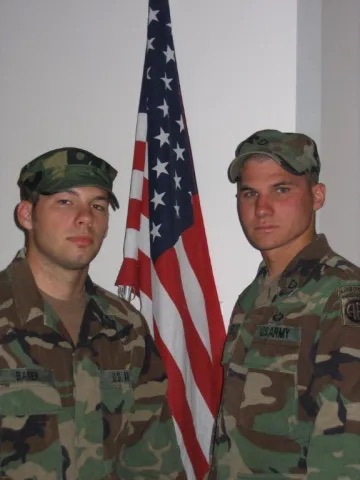On the narrow back road leading to our small town, Dad was driving his 1953 Dodge four door sedan to the building supply store with a fifty-five gallon drum in the trunk. I was now four years old, standing proudly in the front seat tucked behind my dad’s right shoulder as we rounded the curves at the speed of 25 miles an hour. In 1966, child seats for cars had not been introduced to the mountain foothills of South Carolina, but I felt as safe as I possibly could behind my dad. I was safe, but twenty-five years earlier, the world’s safety was being threatened.
In December of 1941 just outside of Honolulu Hawaii the safety of the United States was shattered. After Japan attacked the US Navel fleet at Pearl Harbor, war was declared between the two countries. Consequently, war was also declared between the US and Germany. With that, the US had entered the second world war. Men like my dad entered the service to protect our country. Many of those men paid the ultimate price of their own lives to secure the safety of their family, friends and those they fought alongside.
My dad lost friends and members of his platoon, but never spoke of them to his youngest son. Even after I became a student of WWII, reading books and watching any documentaries to learn all I could about the war, he said nothing about his time at war except a couple of stories he told me over and over. They were sanitized and superficial, but he wanted to convey a specific point to me.
While dad and I were riding in that 1953 Dodge, he was telling me that the Memorial Day weekend was starting. Then he explained to me that Memorial Day is a day dedicated to those who had died at war.
Veterans from that era had many different ways of honoring their fallen brothers. Dad’s way was to build a safe and secure place for his family to live. The 55 gallon drum in the trunk was for sand. He did not have a truck at the time, so the drum carried the sand in the car’s trunk. It was our tradition to work on projects around the house on holidays. That year we were pouring a concrete sidewalk. But that morning, the red poppy was on the table by dad’s coffee cup. He stared at it for a long time.
The tradition of Poppies (thin flowers) made from paper in honor of the fallen soldiers had been around for almost a hundred years by that time, but the Veterans of Foreign Wars started selling them after World War One with the proceeds going to veterans in need.
Mom always made sure that she bought a red poppy for dad. From the emphasis mom put on it, I understood that this was very important and that it reminded us of the men that died for our country. When I watched dad with his poppy there seemed to be more to it than I knew. He handled the paper flower with tender care. I watched. He never spoke.
One day in my teen years, I was watching the movie “The Bridge at Remagen” while my dad was working in his shop. The movie was about the allies crossing the Rhine River into Germany on the final push to win the war in Europe. I was enthralled with the movie when he walked into the den on the upper level behind me. I heard him enter the room, but did not hear him leave. I glanced around and saw him there; just standing and watching from a distance. He moved closer. I paid him no attention until he spoke. “I was up river about a half mile from there,” He declared.
I almost fell off my chair when I jerked around to face my dad seeing the remnant soldier’s memories from 1945 coming out of my father. Completely forgetting there was a movie playing, I exclaimed, “What?” With that prompting, he began the most lengthy description of the war he had ever given me. It lasted for no more than 30 seconds and he fell silent again. The last thing he told me was that the water current was so swift that they had to turn the DUKW into the current and cross the river at an angle. The DUKW was called the Duck. It was a two and a half ton truck that was made to be amphibious in order to ferry men and supplies across water onto dry land. While crossing the Rhine, the soldiers in the back of the truck were somewhat protected, but the driver was one hundred percent exposed to enemy fire from the other side of the river.
How did dad know that information with the detail he described? I thought about it a lot before I realized that he was sitting in the shotgun seat beside his driver. In that combat situation, there had to be someone who could pull the driver out and take over driving the truck if he was shot, or else the truck and all of the soldiers in the back would be lost. Dad was the mechanic and the back up driver. He had previously told me that in Germany, he was both the mechanic and driver.
It was now obvious. Dad’s driver and friend was killed right beside him so he had to pull his friend out of the seat and keep driving. No wonder he stared at the poppy so long every Memorial Day. Was he thinking about his friend? Now, I better understood the long gazes at the red poppies by his coffee cup each year on Memorial Day.
In 2008 on Memorial Day, I walked into a restaurant with my son, Thomas. He had just returned from deployment in Iraq. He had on something that identified him as a soldier. A lady recognized him, declared him a hero and began to thank him for his service. He winced and backed away. When she finished thanking him and walked away, I said, “Son, you need to be more gracious to people who show you their appreciation.”
In fresh pain, Thomas recoiled saying, “This is not a day for those of us that came home. It is for our friends who did not make it back. They are the real heroes.”
Now I understood even more, but I realized I would never understand how they felt.
In honor of the fallen.
“To those who gave everything for those they loved.”

